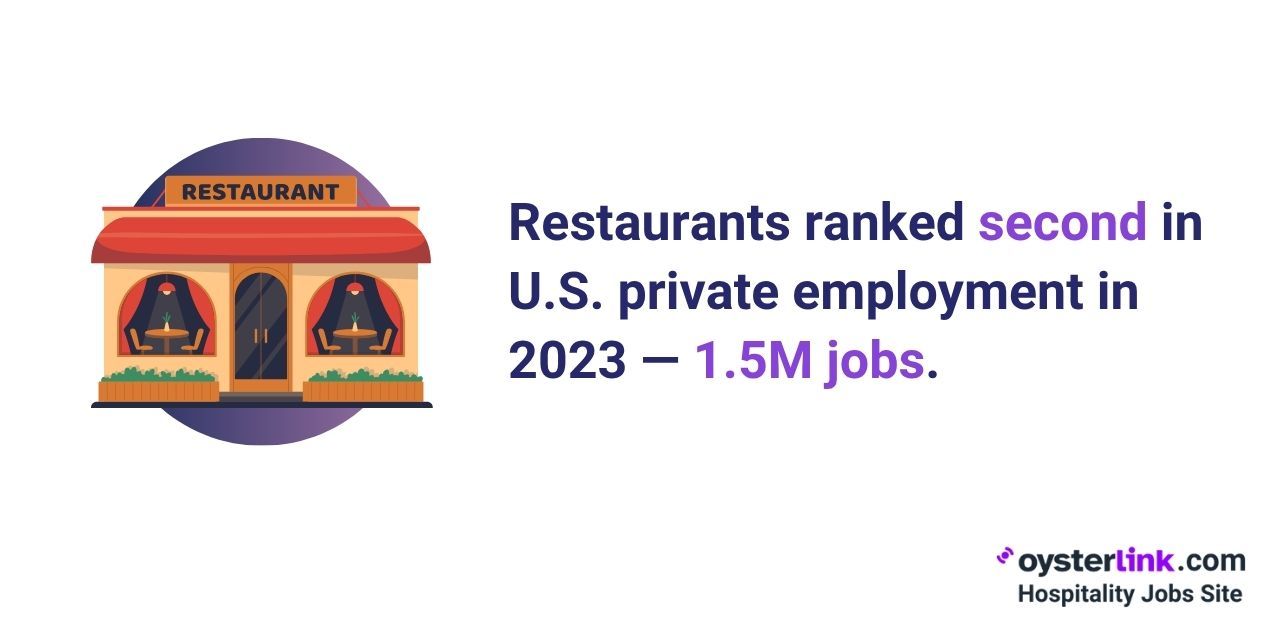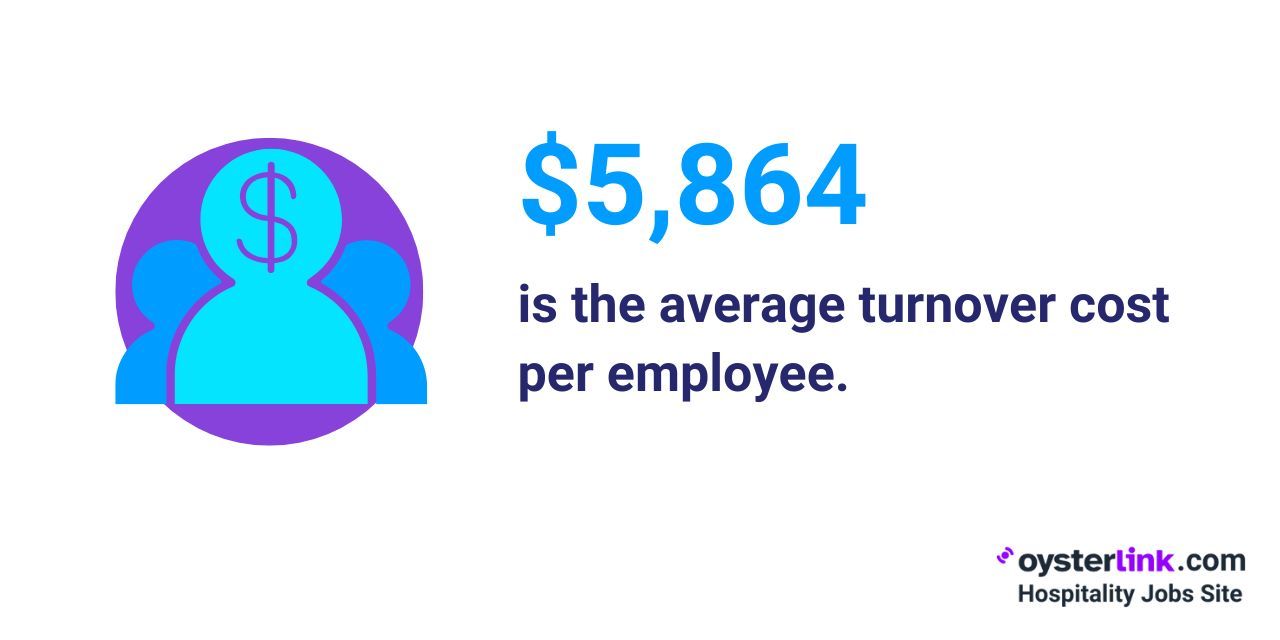How To Hire Kitchen Staff: Key Findings
- The restaurant industry has one of the highest turnover rates — 5.9% in May 2025.
- OysterLink offers access to 400,000+ candidates and unlimited job posts at just $50 per post — ideal for both front and back-of-house hiring.
- Replacing a single hospitality worker costs $5,864, so onboarding, benefits and workplace culture are key to retention.
This guide will help you hire kitchen staff and build a strong back-of-house team with the best job posting platforms, free job descriptions and proven retention strategies.
Understanding Key Roles When You Hire Kitchen Staff
Before hiring, it’s important to understand kitchen roles and responsibilities to match the right talent and reduce turnover.
In May 2025, the separation rate for accommodation and food services was 5.9%, meaning over 1 in 20 workers left their jobs that month.
The chart below compares this with separation rates in other major industries.
Best Places To Hire Kitchen Staff
Job growth in restaurants has steadily increased since 2020. In fact, by the end of 2023, the restaurant industry became the second-largest private sector in the U.S., with 1.5 million jobs or 10% of the total workforce.

With many other dining establishments vying for the same talent, you need to be strategic in your hiring process.
Below, we’ve listed various places where you can start posting a job.
Job platforms
General job boards like ZipRecruiter, Indeed and Monster offer broad reach but often attract unqualified candidates, leading to longer hiring times and higher costs.
A platform like OysterLink is built for the service industry, helping employers find qualified candidates for just $50 per post.
Its streamlined posting process saves time, so hiring managers can focus on choosing the right talent—not getting stuck in a slow recruitment cycle.
Social media
Using your company’s social media accounts to advertise job openings isn’t new.
According to a survey, 94% of recruiters say they use social media for hiring.
With so many people active on social media, it’s a smart way for employers to reach potential candidates where they already are.
While it can speed up hiring, social media also comes with some drawbacks.
| Pros of Social Media | Cons of Social Media |
|---|---|
| Quick to post jobs | Can introduce bias by viewing applicants’ profiles |
| No payment required unless boosting a post | Limited character count on platforms like TikTok and X restricts details |
| Easy to share, speeding up referrals | Sifting through candidates takes a lot of work as anyone can apply |
| Great for showcasing company culture through photos, stories and updates | Job seekers who experienced scams on recruitment via social media may be hesitant to apply |
On-demand staffing agencies
On-demand staffing platforms like Qwick and Snagajob connect employers with shift-based workers to quickly fill open roles.
They offer flexibility to scale staffing up or down based on demand.
Employers share shift details, and the platform recommends matching candidates. From there, companies choose a worker to fill the shift.
| Pros of On‑Demand Staffing Agencies | Cons of On‑Demand Staffing Agencies |
|---|---|
| Quick access to qualified candidates | Can be expensive |
| Faster hiring process | Less control over the recruitment process, potentially resulting in a candidate mismatch |
| Allows employers to quickly scale or reduce workforce as needed | Limited interaction with the candidate during the hiring process can lead to a culture gap once they’re onboard |
| Ability to fill niche or hard‑to‑staff roles through agency expertise | Can lead to a high turnover rate |
Recruitment agencies
Recruitment agencies focus on full-time hires and follow a longer, more thorough process than on-demand staffing platforms.
With tools like social media and job boards on the rise, some question if agencies are still relevant. If you're unsure, explore the pros and cons below.
| Pros of Recruitment Agencies | Cons of Recruitment Agencies |
|---|---|
| Saves time and effort | High cost |
| Higher chances of getting skilled candidates | Limited employer branding |
| Access to wider talent networks and hard‑to‑reach candidates | Agencies may focus too much on job fit and overlook company culture, causing potential mismatches |
Use technology
Using technology can speed up hiring. ATS helps manage applications and schedule interviews. Video calls streamline early screening, while online tests assess skills before in-person steps.
Word of mouth
Word-of-mouth is a powerful way to find skilled kitchen staff. Referrals save time and offer insight into both a candidate’s skills and fit within your team.
| Pros of Word of Mouth | Cons of Word of Mouth |
|---|---|
| Higher chances of getting candidates who are both culturally fit and skilled | Limited candidate pool |
| Cost‑effective | Potential bias |
| Speeds up the hiring process | Risk of favoritism or perceived unfairness among existing staff |
Conducting Interviews With Applicants
Now that you know where to post jobs and have clear descriptions, it's time to conduct interviews to assess both skill and culture fit.
According to a study, 89% of hiring failures happen because the candidate wasn’t a good fit culturally — not because they lacked skills.
Implementing a structured interview process
Conducting structured interviews is crucial to assess candidates effectively. Consider the following steps:
- Prepare Standardized Questions: Develop a set of questions focusing on experience, problem-solving abilities, and adaptability.
- Practical Assessments: Include a hands-on component where candidates demonstrate their culinary skills in a controlled setting.
- Cultural Fit Evaluation: Assess whether the candidate's values and work ethic align with your restaurant's culture, promoting a harmonious work environment.
Ask the right questions
Interview questions should reveal personality, skills and cultural fit.
Pro Tip: OysterLink offers curated questions for every kitchen, hotel and events role—including 50 top Chef questions and categorized Cook questions (skills, experience, behavior).
Watch their body language
A candidate’s actions can speak louder than words. For leadership roles like Executive Chef, confident posture and presence matter just as much as answers.
Trust your gut
Even if a candidate seems perfect on paper, trust your instincts. If something feels off, seek more input before making a decision.
Advice From a Seasoned Restaurant Consultant
OysterLink recently interviewed Emily LaRuffa, a seasoned hospitality professional with over two decades of professional bar, restaurant and hotel experience.
We asked her how she manages to attract young people to start working in the hospitality industry. This was part of her response.
How to attract young people to start working in the hospitality industry?
Emily: "My first approach is getting to know where a person is at. Understanding the motivation and goals of every person can help us guide them towards a career path in hospitality.
A lot of people end up in hospitality to pay the bills but end up loving it. The important part is to showcase a potential career path to them, show them they don’t have to stay in a Server role for a long period of time. People can quickly grow from the hourly level positions to become Captains or Sommeliers and earn incredibly well. From there they can go into management and build on that."
Emily LaRuffa, Restaurant Consultant and owner of Oracle Hospitality
Kitchen Staff Roles and Job Descriptions for Hiring
Hiring strong kitchen staff starts with clear job descriptions. Below, we cover key back-of-house roles to help you decide which ones you need.
Good descriptions outline duties, required experience, certifications (like food safety), and key skills such as teamwork and time management. This helps attract candidates who match your kitchen’s needs.
Baker

A Baker produces a variety of baked goods. Their responsibilities can vary widely depending on where they work.
Bakers in cafes, restaurants and bakeries generally need to be able to follow recipes, have good customer service skills and possess knowledge of food safety.
Chef

A Chef is a professional cook in charge of leading the kitchen. Aside from culinary skills, they also need to be proficient in managing people and ensuring food quality and safety.
To find a Chef for your restaurant, you need to have a clear understanding of what type you need as there are many different types within the French kitchen brigade system which we’ll discuss below.
Sous Chef

Sous Chefs work as second in command in the kitchen. Depending on the size of the restaurant, they may work alongside the Head Chef or Executive Chef.
When considering how to find a Chef, particularly for the Sous Chef position, it’s important to look for qualities such as proven leadership experience and extensive knowledge of food preparation and cooking techniques.
Pastry Chef

Hiring Chefs for the pastry department requires proficiency in baking, creativity and attention to detail.
Since visually appealing pastries contribute to the restaurant’s reputation, Hiring Managers must be careful in writing job descriptions to filter out candidates who lack baking skills and experience in cake decorating, using professional kitchen equipment and flavor pairing.
Sushi Chef

Like Pastry Chefs, Sushi Chefs need to have a strong emphasis on attention and aesthetic appeal. Preparing sushi is considered an art form.
Therefore, if you’re looking to understand how to find a Chef for your restaurant, your job description should highlight the ability to work with different types of fish, ensure ingredient quality and previous experience.
Head Chef

A Head Chef, also known as Chef de Cuisine, is often confused with an Executive Chef.
However, the two have distinct sets of responsibilities. While Head Chefs are more hands-on with day-to-day operations, Executive Chefs focus on establishing company culture and managing finances.
Large corporations typically hire both Head Chefs and Executive Chefs, but for independent restaurants, a Head Chef usually suffices.
Executive Chef

The Executive Chef is the head of the kitchen, or multiple kitchens in many instances.
To find Chefs looking for work at this level, it’s essential to recognize that reaching this role requires years or even decades of experience, as it demands skills and knowledge not only in cooking but also in business management.
This leadership position involves collaborating with the Restaurant Manager to set dish prices, training the kitchen staff and preparing financial reports.
Private Chef

Private Chefs are usually employed by individuals to cook and prepare meals for households, but they can also be hired by senior care facilities, schools and companies.
It’s important to know the difference between a Private Chef and a Restaurant Chef because their skill sets and work environments vary significantly.
If you’re considering how to find a Chef for your restaurant, it’s better to focus on highlighting requirements regarding experience cooking in dining establishments as Private Chefs may lack the high-volume cooking skills necessary for a restaurant setting.
Cook

A Cook’s responsibilities can depend on the size of the kitchen. In larger ones, there may be several specialized Cooks, such as Line and Prep Cooks.
Regardless, they’re all managed by a Chef and require good knowledge of different kitchen equipment, proficiency in various cooking techniques and attention to detail.
If you’re looking for Cooks to hire, it’s important to be clear about their main tasks. Will they be solely in charge of preparing ingredients for Chefs or will they be assigned to a specific station? Knowing this will allow you to be as specific as possible in the skills and experience you require.
Line Cook

Line Cooks are often assigned to specific stations (think fry, grill and sauté). Given this, they must excel in different cooking techniques in order to do different dishes efficiently and consistently.
They must also have strong multitasking skills and the ability to stay calm under pressure in order to manage high order volumes.
If you're looking into how to find a Cook for your restaurant, it's essential to emphasize these skills in your job description to attract qualified candidates who can thrive in a fast-paced environment.
Prep Cook

As its title suggests, Prep Cooks are responsible for preparing ingredients for cooking. This includes cutting vegetables, slicing meat and storing items properly.
They sit at the bottom of the kitchen hierarchy but their role is important to ensure seamless kitchen operations.
When looking for Cooks in charge of assisting Chefs with making sure all ingredients are ready, make sure to include excellent organizational skills, knowledge of food preparation techniques and the ability to work well with others in the job description.
Dishwasher

A lot of Chefs and Kitchen Managers started in the hospitality industry as a Dishwasher. A Dishwasher’s task may sound simple, but they’re crucial in maintaining the cleanliness and orderliness of the kitchen, as well as securing the health of the customers.
As this is an entry-level role, there’s no minimum education or experience required, making it a role that’s relatively easy for Hiring Managers to fill.
Fast-Food Worker

Also known as a Crew Member, a Fast-Food Worker is a popular part-time job among high school students or 16-year-olds looking for a job.
Similar to Dishwashers, Fast-Food Workers aren’t generally required to have a formal education or previous experience to get started.
Training to perform duties such as taking orders, handling cash and preparing food can be done while on the job.
Kitchen Manager

Kitchen Managers usually work in dining establishments that are part of a chain. For example, McDonald’s, Olive Garden and Chili’s are all places where strict adherence to operational procedures, company branding and standardized recipes is a must.
A Kitchen Manager’s role is important in creating a consistent dining experience across all locations.
How To Retain Kitchen Staff
When it comes to the hospitality industry, it’s not just hard to find kitchen staff, it’s equally challenging to retain them.
High turnover rates hurt not just staff morale but also the financial health of the business. According to the Center for Hospitality Research at Cornell, the average turnover cost is $5,864 per employee.

To help you address this challenge, below are some ideas you can work on to enhance employee satisfaction.
Offer a competitive benefits and compensation package
Paying slightly above market rate gives you an edge over other restaurants. If that’s not possible, offer strong benefits like flexible schedules, paid time off and career training to show you value your staff.
Do proper onboarding
Studies show that up to 20% of staff turnover happens within their first 45 days of employment. Yet, many companies still aren’t investing enough time and effort into the onboarding process.
Instead of just allotting a week or two to familiarize new staff with the kitchen layout, safety protocols and team dynamics, why not consider extending the onboarding period?
This could involve evaluating their performance in real-time and scheduling regular check-ins to ensure that the new hires are adjusting well.
Improve your business culture
Create a safe space for kitchen staff to share concerns without fear. Regular one-on-one check-ins help managers address issues early.
Foster a respectful culture by backing your team — set clear policies and train staff to handle difficult customer interactions confidently.
Hire Kitchen Staff on OysterLink
OysterLink stands out as the best platform for hiring kitchen staff. It streamlines restaurants’ recruitment process by connecting you to a pool of candidates with relevant skills and experience. Plus, it allows you to post unlimited job openings, making it easy to fill all your kitchen staffing needs quickly and efficiently.
.jpg)


.png)

.png)
.png)